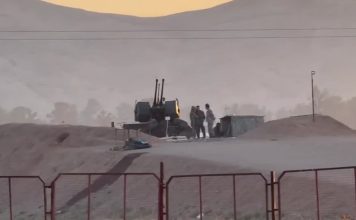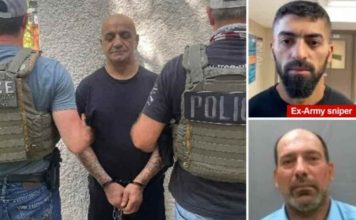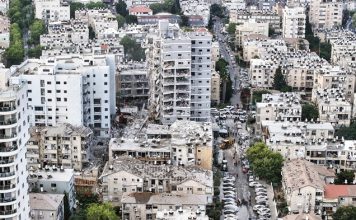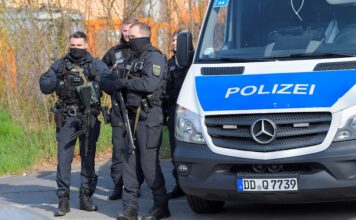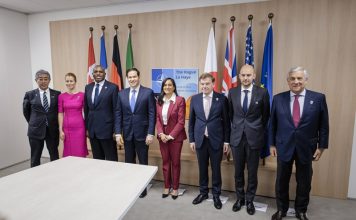By Ahmad Rafat
Enrique Mora, the European Union’s chief negotiator in the Vienna talks to revive the 2015 Joint Comprehensive Plan of Action (JCPOA) — the Iran nuclear deal — traveled to Tehran on May 10 to meet Ali Bagheri-Kani, Deputy Foreign Minister and Iran’s envoy to the Vienna talks.
Following the meeting, one of Mr. Mora’s colleagues told Kayhan Life that “[we] see no light at the end of the negotiation tunnel.”
[aesop_image img=”https://kayhanlife.com/wp-content/uploads/2022/05/2022-05-11T095657Z_214790898_RC2X4U9ILYNQ_RTRMADP_3_IRAN-NUCLEAR-TALKS.jpg” panorama=”off” credit=”REUTERS./ ” align=”center” lightbox=”on” captionsrc=”custom” caption=”Iran’s Deputy Foreign Minister and Chief Nuclear Negotiator Ali Bagheri Kani speaks with Deputy Secretary General of the European External Action Service (EEAS), Enrique Mora, in Tehran, Iran, May 11, 2022.” captionposition=”left” revealfx=”off” overlay_revealfx=”off”]
However, the mood changed completely when Qatar’s Emir Sheikh Tamim bin Hamad Al Thani traveled to Tehran a day after Mora’s visit and held talks with President Ebrahim Raisi and Iran’s Supreme Leader Ayatollah Ali Khamenei.
A day before the Emir’s trip to Tehran, Mora had stopped in Doha on his way back to Brussels and held meetings with senior Qatari officials.
Mora and the Qatari officials’ shuttle diplomacy seems to have breathed new life into the JCPOA, which many believed was all but dead.
There are talks about returning to the negotiation table, breaking the deadlock, and removing all obstacles to reaching a new nuclear deal.
“It has gone better than expected,” Josep Borrell, High Representative for the Common Foreign Affairs and Security Policy of the European Union, said about Mora’s visit to Tehran. “The negotiations were stalled. And now they have been reopened. We see the prospect of reaching a final agreement.”
Enrique Mora is the chief of staff of Mr. Borrell and deputy secretary-general of the European External Action Service (EEAS).
Iranian Foreign Minister Hossein Amir-Abdollahian struck the same optimistic tone.
“A good and reliable agreement is within reach,” Mr. Abdollahian tweeted.
A spokesperson for the U.S. State Department said on May 13: “We appreciate the European Union’s efforts to revive talks on restoring the 2015 Iran nuclear deal, but there was no agreement yet and no certainty that one might be reached.”
What happened during Emir Sheikh Tamim bin Hamad Al Thani’s visit to Tehran? What did he propose that persuaded Iran to return to the negotiation table after abandoning the talks in February?
Some have speculated that the Qatari Emir has offered Tehran a “middle-of-the-road solution.” He will most likely discuss the proposal during his trips to Europe and the U.S.
The Islamic Republic has made three demands before talks can yield any concrete results, namely: that the U.S. remove the Islamic Revolutionary Guards Corps (IRGC) from its list of foreign terrorist organizations (FTO); a guarantee from the White House that the U.S. would not withdraw from the JCPOA again; and the lifting of all sanctions on Iran.
The U.S. withdrew from the JCPOA in May 2018 unilaterally and imposed strict economic sanctions on Iran. It also added the IRGC to the FTO list in April 2019.
The U.S. has an indirect role in the Vienna talks and has only accepted the third condition so far.
The second condition is not legally binding because no U.S. president or administration can guarantee that a future American government will not reverse the decision.
Some people believe that the Qatari Emir’s “middle of the road” proposal concerns the first condition. It calls for the U.S. to remove the IRGC from its FTO list but to add the IRGC’s Qods Force (IRGC-QF), which conducts extraterritorial operations, to the Department of the Treasury’s Specially Designated Global Terrorist (SDGT) list.
The SDGT is part of the broader Specially Designated Nationals and Blocked Person (SDN) list, formed following Executive Order 13224 (Blocking Property and Prohibiting Transactions with Persons Who Commit, Threaten to Commit, or Support Terrorism), issued by former U.S. President George W. Bush in September 2001.
While the U.S. State Department administers the FTO list, the Office of Foreign Assets Control (OFAC) of the U.S. Department of Treasury enforces the SDN list.
Removing the IRGC from the FTO list, but adding the Qods Force to the SDGT list, is more like a magic trick than a serious attempt to restore peace and stability to the Middle East. However, the proposal could pave the way for further talks.
There are people in the U.S. and Iran who oppose the revival of the 2015 nuclear deal altogether.
U.S. Praises EU’s Iran Nuclear Push, but No Certainty of Deal
The U.S. Senate passed two resolutions earlier in May, one of which opposed removing the IRGC from the FTO list, while the other called for maintaining sanctions on the Islamic Republic of Iran Central Bank.
The U.S. president can sign a nuclear agreement with Iran irrespective of these two bills, because they are not binding. The U.S. president has much power and does not have to get the approval of the House of Representatives and the Senate most times.
Many in the Islamic Republic oppose rebooting the JCPOA and opening talks with the U.S. Some groups amass great financial wealth by devising methods to bypass the sanctions. Normalizing relations with the international community, particularly the West, will threaten their lucrative enterprises.
There is also an ultra-conservative faction in Iran that opposes normalizing relationships with the West on ideological grounds. They promote strengthening ties with the East, particularly Russia and Vladimir Putin. They believe that any agreement with the West, especially after Russia’s military attack on Ukraine, would further weaken Putin, who is already feeling the weight of crippling international sanctions. Hossein Shariatmadari, the managing editor of the Tehran-based hardline Kayhan Newspaper, is the most notable figure in this camp.
Before the invasion of Ukraine, Russia was eager to lead the nuclear talks, but it has now turned into a staunch opponent of any deal.
A day after Enrique Mora visited Tehran, the chief Russian envoy to the Vienna talks, Mikhail Ulyanov, tweeted: “Under different circumstances, Russia probably could have provided its good offices to the two sides to finalize an agreement; on [the] JCPOA, but not now.”
The war in Ukraine and comprehensive sanctions on Russia have threatened oil and gas security in Europe. Germany and Italy’s gas reserves will run out by next winter.
Europe desperately needs a new source of gas supply. Although efforts to find new resources in Sub-Saharan and North Africa have been successful, they have not solved the problem. After Russia, Iran has the largest gas reservoir globally and can meet Europe’s needs if sanctions are lifted.
Before the military invasion of Ukraine, it was the U.S. that pushed for a new nuclear agreement with Iran. But the situation has changed now, with the EU leading the efforts to revive the JCPOA. Rebooting the 2015 nuclear deal has become a priority for European countries that want to see Iranian oil and gas return to the global market.
However, some experts believe that the lifting of sanctions and the return of Iranian oil and gas to the Western market will not affect prices significantly.
Saudi Arabia and the United Arab Emirates (UAE) have warned that unless the new nuclear deal curbs Iran’s regional military activities and missile program, they will reduce their oil and gas export by the exact volume of Iranian oil and gas sold to the West after sanctions are lifted, which will keep the prices the same on the global market.
Saudi Arabia and the UAE are extremely unhappy with President Joe Biden’s decision to remove Yemen’s Houthi rebels from the FTO list. The move prompted both countries to remain neutral regarding the military attack on Ukraine and refused to condemn Russian action or join global sanctions against that country.



